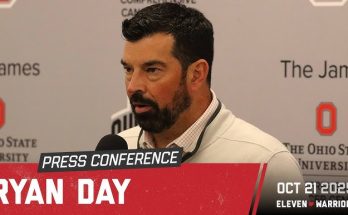Curtis Lofton Resigns as General Manager of OU Football: A Major Shift for the Program
In a surprising move that has sent shockwaves through the Oklahoma Sooners football program, Curtis Lofton, who served as the general manager of the team, has officially announced his resignation. Lofton’s departure marks the end of an era for the Sooners’ football operations, as he played an integral role in helping to shape and streamline the team’s daily functions and recruitment efforts in recent years.
Lofton, a former All-American linebacker and NFL veteran, joined the Oklahoma football program in 2021, taking on the role of general manager after a distinguished playing career. Known for his leadership, work ethic, and commitment to excellence, Lofton was expected to bring his wealth of experience to the administrative side of the program, helping manage the recruiting process, player development, and various off-field operations. Under his guidance, the program saw several advancements in terms of talent acquisition and operational efficiency, but despite the successes, Lofton has decided to step down, citing personal reasons.
As one of the key figures in the OU football organization over the last few years, Lofton’s resignation raises several questions about the future direction of the team, especially with the changing landscape of college football. With NIL (Name, Image, and Likeness) deals, transfer portal dynamics, and other emerging challenges in the sport, Lofton’s departure could have significant ramifications for both the football program and the broader athletic department.
This article will take an in-depth look at Curtis Lofton’s tenure as OU’s general manager, the potential reasons behind his resignation, the implications for Oklahoma football moving forward, and what this shift means for the team’s overall structure as they aim to continue competing for championships.
Curtis Lofton’s Role as General Manager
Curtis Lofton, a standout linebacker during his time at the University of Oklahoma, was no stranger to the program when he took on the role of general manager. Lofton earned All-Big 12 honors during his collegiate career before going on to play in the NFL, where he enjoyed a successful career with the Atlanta Falcons and New Orleans Saints.
When Lofton joined the OU football program in 2021, his role as general manager was designed to help elevate the program’s operations. The general manager position was created as part of a broader effort by the university to adapt to the rapidly changing landscape of college football, particularly with the introduction of the transfer portal and NIL regulations. As general manager, Lofton was tasked with overseeing the logistical and operational side of the program, including managing player development, recruiting, and team-building efforts.
One of Lofton’s key responsibilities was to streamline the recruitment process, working closely with head coach Brent Venables and the rest of the coaching staff. Lofton’s experience in the NFL, coupled with his deep understanding of the college football landscape, made him a valuable asset in assessing talent and assisting with recruitment strategies. Lofton’s ability to connect with players, coaches, and staff members, as well as his commitment to helping the team succeed, played a major role in Oklahoma’s ability to secure top-tier talent.
Lofton’s role also extended to managing the team’s off-the-field operations, ensuring that the day-to-day operations ran smoothly, and that players received the support they needed to succeed. This involved helping with everything from academic support to mental health services and overall well-being. His hands-on approach to managing the program and his personal connection with the athletes made him a respected figure in the organization.
What Led to Lofton’s Resignation?
While Curtis Lofton’s resignation may have come as a surprise to many, it is not entirely clear what led to his decision to step down from his role as general manager. Lofton himself has not provided a detailed explanation for his departure, only citing personal reasons for his decision. However, several factors could have contributed to Lofton’s decision to leave at this point in his career.
Personal Circumstances: Lofton’s resignation could be the result of personal or family matters that require his attention. The high demands of his role as general manager, combined with the stresses of managing a college football program at a high level, may have led him to reevaluate his priorities. It is common for individuals in high-pressure positions to make such decisions when faced with competing demands from their personal and professional lives.
Evolving Role in College Football: The world of college football has undergone significant changes in recent years, particularly with the introduction of NIL regulations, the transfer portal, and other evolving factors that impact player recruitment and development. Lofton’s resignation could be partially related to the complexity of these changes. As a former player, Lofton may have felt the pressure of adapting to these new dynamics, particularly when navigating relationships with high school recruits, current players, and the broader college football community.
The introduction of NIL has created challenges for many in college football programs, including general managers who now must deal with additional off-field complexities. The recruiting landscape has drastically shifted, and with programs around the country adopting different strategies for handling NIL opportunities, Lofton’s role in managing these aspects may have become more difficult as time went on.
Internal Challenges: Another potential factor in Lofton’s resignation could involve internal challenges within the Oklahoma football program. Though the Sooners have seen success under Brent Venables since his arrival as head coach, there may have been growing internal pressure to meet higher expectations and deliver championships. Lofton’s decision to step down may have been influenced by internal disagreements or differences in vision regarding how the program should evolve.
Additionally, Lofton’s position as general manager may have placed him at the intersection of coaching staff decisions, recruitment, and broader program management, which can lead to tension. Managing a large and complex football program comes with its own set of challenges, and it’s possible that Lofton reached a point where he felt his efforts were not being fully realized or aligned with the overall direction of the program.
Immediate Impact of Lofton’s Departure
The departure of Curtis Lofton as OU’s general manager could have a number of immediate effects on the football program, particularly in areas related to recruitment, player development, and team operations. Given the growing emphasis on off-field management in college football, the role Lofton played was crucial to ensuring that the team ran smoothly on a day-to-day basis. With Lofton’s resignation, Oklahoma will need to find someone who can fill this gap and continue the work Lofton began.
Recruiting: One of the most immediate impacts of Lofton’s resignation could be felt in recruiting. Lofton’s experience as a former player, his connections within the football world, and his understanding of the needs of the Oklahoma program made him a valuable resource for both coaches and recruits. His relationship-building skills were instrumental in ensuring that the Sooners remained competitive in securing top-tier talent. The loss of Lofton’s leadership could present challenges in recruiting, particularly in the current climate of college football where recruiting plays an increasingly central role in the program’s success.
Team Operations: Lofton’s role in managing team operations was essential to the smooth functioning of the program. His leadership in ensuring that players received academic support, mental health resources, and the tools they needed to succeed on and off the field cannot be understated. The absence of Lofton in this role may lead to temporary disruptions as the athletic department seeks to fill his position and adjust to the change.
Program Culture: Lofton’s resignation could also have an impact on the culture within the Oklahoma football program. Having someone in a leadership position who understands the intricacies of both college football and the demands placed on student-athletes is critical to maintaining a positive culture. Lofton’s hands-on approach and connection with players played a significant role in shaping the team’s mindset and ensuring that players remained focused on their development. His departure may require a cultural adjustment as new leadership steps in.
What’s Next for Oklahoma Football?
Looking ahead, the Oklahoma Sooners football program will need to address the void left by Lofton’s resignation in order to maintain their competitive edge in the SEC and continue striving for championships. The Sooners have built a reputation as one of the top programs in college football, but with Lofton’s departure, the program will need to evaluate its operations and leadership structure.
The university may opt to bring in a new general manager, or they could redistribute Lofton’s responsibilities among current staff members. Whoever fills the role will need to navigate the evolving challenges of college football, including the increasing influence of NIL, the transfer portal, and the heightened expectations placed on top programs like Oklahoma.
Additionally, Coach Brent Venables will likely need to reassess how he structures the support staff and their respective roles within the program. Recruiting and player development will continue to be key areas of focus, and whoever takes over Lofton’s duties will need to ensure that Oklahoma can remain competitive both on and off the field.
Conclusion
Curtis Lofton’s resignation as general manager of Oklahoma football marks the end of a notable chapter in the program’s history. Lofton’s influence on the team, both through his role in recruitment and his leadership in operational aspects, has been profound. His departure, while surprising, opens the door for changes that could shape the future of the program as they continue to navigate the challenges of modern college football.
As the Sooners move forward, the focus will now shift to finding a suitable replacement for Lofton, one who can continue to build on the foundation he helped lay. Whether the program looks internally or externally for the next general manager, the leadership of Oklahoma football will remain under the microscope as they strive for continued success in the evolving landscape of college football.



